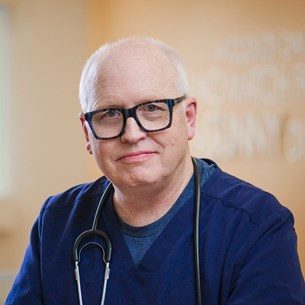Meeting
2021 ASCO Quality Care Symposium

OHC (Oncology Hematology Care)/US Oncology Network, Cincinnati, OH
David Michael Waterhouse, Caleb Burdette, Dan Davies, David R. Drosick, Molly Mendenhall
Background: Biosimilars are clinically equivalent and highly similar to brand yet cost significantly less. Financial savings are shared by patients, practices and payers, ranging anywhere from 21-24% based on 10/01/20 ASP data from CMS. The effective conversion to biosimilar products is vitally important to total cost-of-care savings and can be achieved without negatively affecting patient outcomes. Physician understanding and confidence in biosimilar products is seen as a major conversion barrier. Methods: Interchangeability is an FDA designation that allows generic drugs to be substituted for reference drugs at the pharmacy, without a physician’s consent. Currently no biosimilar has that FDA approval for interchangeability. Building on previous pharmacy auto-substitution processes with therapeutic interchange, a formalized biosimilar policy and SOP was developed to automate conversion from the reference biologic product to the P&T/Physician approved biosimilar. Workflow changes were instituted to alleviate the provider burden of patient-by-patient decisions and placed them with the pharmacy review team. Full staff support and understanding on biosimilar usage was endorsed through mandatory biosimilar education of physicians, advanced practice providers, pharmacists, nurses, financial navigators and prior authorization team members and tracked using meeting attendance and the online E-learning system. Patient education was verified using established teaching visits by tracking documentation in the electronic health record (EHR). Quantitative metrics and reports were developed to assist in tracking the number of unique patients receiving the brand or biosimilar agents. Billed product units per month were also tracked to facilitate auditing and assure accuracy. Baseline brand/biosimilar utilization data for Rituximab, Trastuzumab, and Bevacizumab was collected from July 1, 2019 through December 31, 2020. Results: During the baseline period of 7/01/19 – 12/31/19, biosimilar conversion ranged from 0% (trastuzumab) to 8.4% (rituximab). Following full staff education and physician consent, systematic auto-conversion to biosimilar products was initiated on January 1, 2020. Conversion rates based upon billed biosimilar units likewise improved from 11.7% (baseline) to 90.2% (2021 Q1) for rituximab, 8.4% to 87.4% for trastuzumab, and 0% to 90.0% for bevacizumab. Conclusions: Rapid and near-complete conversion from brand product to FDA approved biosimilar is feasible, measurable and can be scaled.
| Quarter | Rituximab | Trastuzumab | Bevacizumab | |||
|---|---|---|---|---|---|---|
| Patients | Biosimilar | Patients | Biosimilar | Patients | Biosimilar | |
| Baseline | ||||||
| 2019 Q3,4 | 202 | 17 (8.4%) | 109 | 0 (0%) | 66 | 2 (3%) |
| 2020 Q1 | 168 | 13 (7.7%) | 88 | 8 (9.1%) | 53 | 10 (18.9%) |
| 2020 Q2 | 152 | 21 (13.8%) | 87 | 15 (17.2%) | 56 | 15 (26.8%) |
| 2020 Q3 | 149 | 77 (51.7%) | 86 | 24 (27.9%) | 52 | 20 (38.5%) |
| 2020 Q4 | 156 | 121 (77.6%) | 91 | 54 (59.3%) | 47 | 44 (93.6%) |
| 2021 Q1 | 135 | 118 (87.4%) | 93 | 83 (89.2%) | 35 | 33 (94.3%) |
Disclaimer
This material on this page is ©2024 American Society of Clinical Oncology, all rights reserved. Licensing available upon request. For more information, please contact licensing@asco.org
2021 ASCO Quality Care Symposium
Poster Session
Poster Session A: Cost, Value, and Policy; Health Equity and Disparities; Patient Experience
Cost, Value, and Policy,Technology and Innovation in Quality of Care,Health Care Access, Equity, and Disparities,Patient Experience,Quality, Safety, and Implementation Science
Guideline-Concordant Care Initiatives
J Clin Oncol 39, 2021 (suppl 28; abstr 15)
10.1200/JCO.2020.39.28_suppl.15
15
A8
Abstract Disclosures
2021 ASCO Annual Meeting
First Author: Lalan S. Wilfong
2021 ASCO Annual Meeting
First Author: Kelly A. McGlynn
2021 ASCO Quality Care Symposium
First Author: Amit Sanyal
2023 ASCO Annual Meeting
First Author: Melody Chang